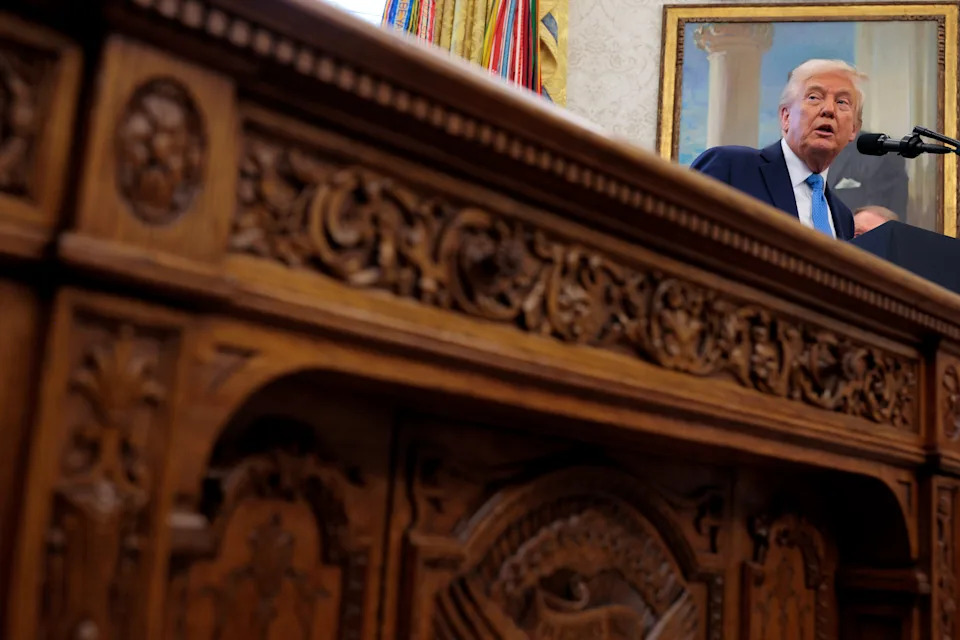President Trump and his team have been aggressive this week in touting their ambitious efforts to strike trade deals.
"We are doing well with every country," the president said Tuesday afternoon, noting how investors seemed to be noticing adding "I see the stock market was up nicely."
But the claims — which have indeed helped spur a market boost that continued Wednesday morning — haven’t yet been backed by concrete signs of progress.
The closest thing to public receipts, as Trump officials like to say, are agreements that essentially boil down to a plan to begin formal talks. The term of art in one recent back and forth was the finalizing of "terms of reference for the trade negotiation."
And it's unclear the status of other major talks — especially with China.
"We're talking to China," offered Trump last week before sidestepping that question Tuesday and then saying Wednesday "everything is active."
That last comment came at roughly the same time that Treasury Secretary Scott Bessent told reporters in a roundtable that tariffs between the US and China need to come down first before talks can begin between the two economies.
"We are engaged in meaningful discussions and look forward to talking with others," Bessent added Wednesday in a speech "China in particular is in need of a rebalancing."
China had previously signaled it wanted to wait on formal talks until it saw things like more "respect."
Foreign Ministry Spokesperson Guo Jiakun responded to Trump's recent comments Tuesday by saying, according to a translation, that "we don't want a trade war, but we are not afraid of one." Yet "our doors are wide open."

These plans and a flood of accompanying optimistic language boosted stock prices alongside a series of signs that Trump is easing back on some of his hardline tariff signals, including a new Wall Street Journal report Wednesday that he is is considering cutting rates on China.
Secretary Bessent declined to comment on that report Wednesday, saying he would be surprised if discussions on slashing tariffs by the administration is happening, noting “no unilateral offer from the president to de-escalate, not at all.”
He instead wants tariffs to decline in a "mutual way” but perhaps the question is how patient markets will continue to be amid what former Treasury official Brad Setser recently described as a “consistent gap” between White House rhetoric and the apparently status in actual talks.
"I think the administration has been spinning a bit too hard here," added Setser, a fellow at the Council on Foreign Relations, in a recent Yahoo Finance appearance. "They want to give the stock market a little bit of hope but the actual negotiations don't seem to be moving nearly as fast."
It’s part of a pattern that has been seen throughout the Trump administration so far on issues from Ukraine to Israel to trade where the White House has opened negotiations on a vast number of fronts — with the president himself often promising a deal will be quick and easy — before actual progress has been slow.
But on trade talks in particular, some suggest that market patience could soon run out.
"He needs to get a deal done or this is going to continue to unravel," added Mahoney Asset Management CEO Ken Mahoney describing the challenges of investing amid "Hurricane Donald."
'Ask me in July'
The gap between rhetoric and concrete results so far has been in evidence throughout the week.
Vice President JD Vance traveled to India and announced "significant progress" toward a “a new and modern trade agreement” — but declined to lay out much detail on exactly what the could entail beyond the aforementioned “terms of reference.”
Then on Tuesday, Bessent grabbed headlines when he told a group of investors that he expects the the trade war between China and the US to de-escalate — while also reportedly noting that talks with the world second largest economy had yet to kick off and a full deal could take 2-3 years.
By Tuesday afternoon, Leavitt touted what she said were 18 formal trade proposals that the administration had received from countries — but then declining to answer followups about whether any of those proposals were acceptable.
The White House press secretary also didn't say whether other possible initial agreements that fall short of a full trade deal would be enough to stave off new tariffs this summer. Politico reported Tuesday the White House was close agreement agreements with Japan and India on such pacts.
“Ask me in July," she responded in reference to the deadline for the 90-day tariff pause Trump announced earlier this month.
By the evening, Trump himself further boosted investor optimism when he weighed in to say China’s 145% tariffs eventually “will come down substantially” — but then offered little sense of the talks saying at one point "if we don’t make a deal we’ll set it, we’ll just set the number."
This post has been updated with additional developments.
Jennifer Schonberger contributed reporting. Ben Werschkul is a Washington correspondent for Yahoo Finance.
